Unit2 Topic1
- 格式:docx
- 大小:28.91 KB
- 文档页数:13
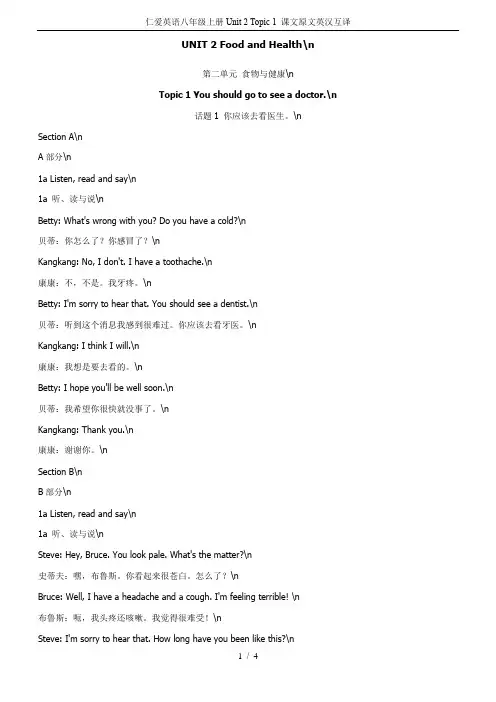
UNIT 2 Food and Health\n第二单元食物与健康\nTopic 1 You should go to see a doctor.\n话题1 你应该去看医生。
\n Section A\nA部分\n1a Listen, read and say\n1a 听、读与说\nBetty: What's wrong with you? Do you have a cold?\n贝蒂:你怎么了?你感冒了?\nKangkang: No, I don't. I have a toothache.\n康康:不,不是。
我牙疼。
\nBetty: I'm sorry to hear that. You should see a dentist.\n贝蒂:听到这个消息我感到很难过。
你应该去看牙医。
\nKangkang: I think I will.\n康康:我想是要去看的。
\nBetty: I hope you'll be well soon.\n贝蒂:我希望你很快就没事了。
\nKangkang: Thank you.\n康康:谢谢你。
\nSection B\nB部分\n1a Listen, read and say\n1a 听、读与说\nSteve: Hey, Bruce. You look pale. What's the matter?\n史蒂夫:嘿,布鲁斯。
你看起来很苍白。
怎么了?\nBruce: Well, I have a headache and a cough. I'm feeling terrible! \n布鲁斯:呃,我头疼还咳嗽。
我觉得很难受!\nSteve: I'm sorry to hear that. How long have you been like this?\n史蒂夫:听到这个消息我感到很难过。
你这个样子有多久了?\nBruce: Two days.\n布鲁斯:两天。
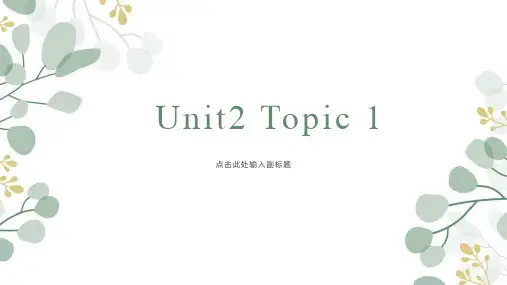
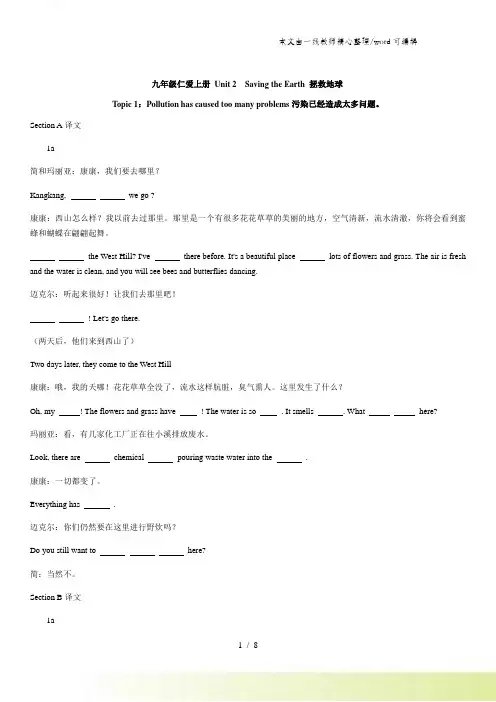
九年级仁爱上册Unit 2 Saving the Earth 拯救地球Topic 1:Pollution has caused too many problems污染已经造成太多问题。
Section A译文1a简和玛丽亚:康康,我们要去哪里?Kangkang, we go ?康康:西山怎么样?我以前去过那里。
那里是一个有很多花花草草的美丽的地方,空气清新,流水清澈,你将会看到蜜蜂和蝴蝶在翩翩起舞。
the West Hill? I've there before. It's a beautiful place lots of flowers and grass. The air is fresh and the water is clean, and you will see bees and butterflies dancing.迈克尔:听起来很好!让我们去那里吧!! Let's go there.(两天后,他们来到西山了)Two days later, they come to the West Hill康康:哦,我的天哪!花花草草全没了,流水这样肮脏,臭气熏人。
这里发生了什么?Oh, my ! The flowers and grass have ! The water is so . It smells . What here?玛丽亚:看,有几家化工厂正在往小溪排放废水。
Look, there are chemical pouring waste water into the .康康:一切都变了。
Everything has .迈克尔:你们仍然要在这里进行野炊吗?Do you still want to here?简:当然不。
Section B译文1a(一个老太太正在咳嗽,她看起来虚弱)An old lady is coughing. She looks .康康:早上好,老奶奶。
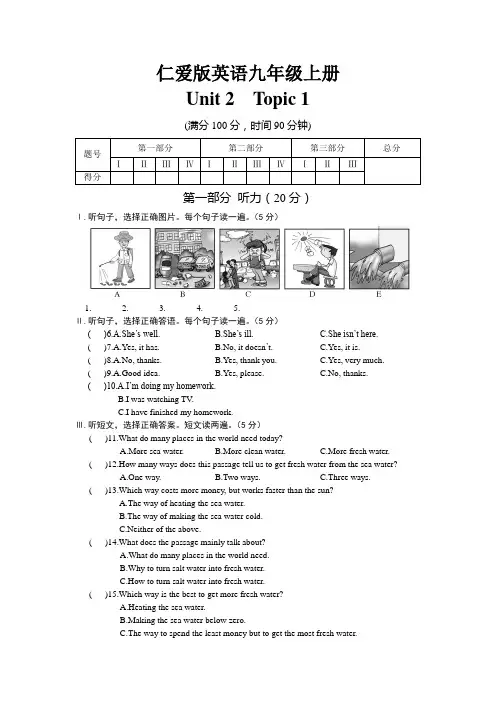
仁爱版英语九年级上册Unit 2 Topic 1(满分100分,时间90分钟)第一部分听力(20分)Ⅰ.听句子,选择正确图片。
每个句子读一遍。
(5分)1._____2._____3._____4._____5._____Ⅱ.听句子,选择正确答语。
每个句子读一遍。
(5分)( )6.A.She’s well. B.She’s ill. C.She isn’t here.( )7.A.Y es, it has. B.No, it doesn’t. C.Y es, it is.( )8.A.No, thanks. B.Y es, thank you. C.Y es, very much.( )9.A.Good idea. B.Y es, please. C.No, thanks.( )10.A.I’m doing my homework.B.I was watching TV.C.I have finished my homework.Ⅲ.听短文,选择正确答案。
短文读两遍。
(5分)( )11.What do many places in the world need today?A.More sea water.B.More clean water.C.More fresh water.( )12.How many ways does this passage tell us to get fresh water from the sea water?A.One way.B.Two ways.C.Three ways.( )13.Which way costs more money, but works faster than the sun?A.The way of heating the sea water.B.The way of making the sea water cold.C.Neither of the above.( )14.What does the passage mainly talk about?A.What do many places in the world need.B.Why to turn salt water into fresh water.C.How to turn salt water into fresh water.( )15.Which way is the best to get more fresh water?A.Heating the sea water.B.Making the sea water below zero.C.The way to spend the least money but to get the most fresh water.Ⅳ.听短文,回答问题。
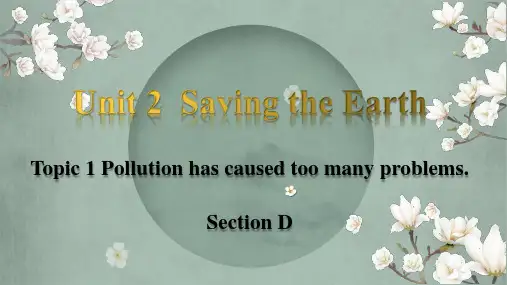
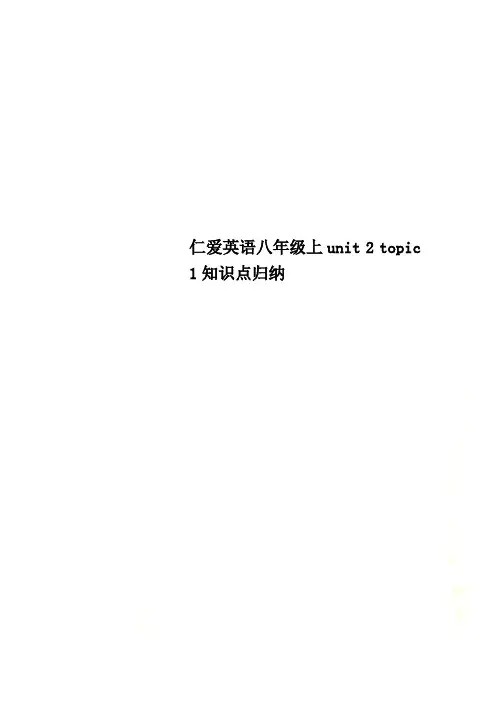
仁爱英语八年级上unit 2 topic 1知识点归纳There is enough food for everybody.2)Enough 用作副词时,意为“充足地,足够地”,一般放在它所修饰的形容词或副词之后。
You can never be careful enough. 你再仔细也不过分。
You are old enough to go to school. 你已到上学的年龄。
Section B※重点短语集锦1.brush one’s teeth 刷牙2.too much+不可数名词too many+可数名词复数"太多"too long 太久much too 太3.lie down 躺下4. have a terrible cold患了重感冒5. Take some medicine 服药6. have the flu 得了流感7. have a good rest 好好休息8. feel terrible感觉难受9. not so well很不好※重点句型背诵1.I’m feeling terrible. 我感觉不太好。
2.How long have you been like this? 你像这样多久了?3.Shall I take you to the hospital? 我带你去医院好吗?4.How are you feeling now? 现在感觉怎么样?Are you feeling better now? Yes, much better.※重要知识点讲解1.How long have you been like this? 你像这样多久了?2.I’m sorry to hear that. 听到那件事,我感到很难过。
"I’m sorry+动词不定式"或"I’m sorry +that 从句"是对所做错事的一种歉意或听到不好消息及令人不愉快的事情时的一种关心,遗憾,惋惜,及感到难过的委婉表达。
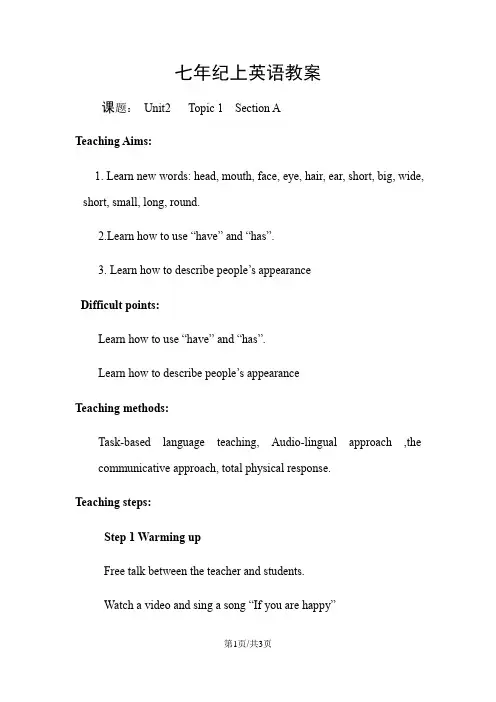
七年纪上英语教案课题:Unit2 Topic 1 Section ATeaching Aims:1. Learn new words: head, mouth, face, eye, hair, ear, short, big, wide, short, small, long, round.2.Learn how to use “have” and “has”.3. Learn how to describe people’s appearanceDifficult points:Learn how to use “have” and “has”.Learn how to describe people’s appearanceTeaching methods:Task-based language teaching, Audio-lingual approach ,the communicative approach, total physical response.Teaching steps:Step 1 Warming upFree talk between the teacher and students.Watch a video and sing a song “If you are happy”Lead-inFrom this video ,we can see many words of body, like hands, feet and eyes. Do you want to learn more about them?Step 2 Presentation1.Learn the new words(1) Learn the new words: listen to 2a carefully and follow ithead, mouth, face, eye, hair, ear, nose, big,wide, short, big, wide, short, small, long, round.Let’s play the game Bobby Says. In order to go over the name of body.(2)Learn the new words: long short, big ,small, wide, round.show pictures and learn adjectives.2 .Remember the new words by themselves. Pay attention to their spellings. Have a competition.Step 3 Consolidation(Ask a student to stand up)T: Who is she?Ss: She is...T: Look, everyone, what does she look like? She has long hair and a round face. What about you? What do you look like?Step 4 listen to the tape 2a and learn how to use have\hasFinish2b and check answersEnjoy an English song “she has, he has”Step 5: Listen and follow 1aListen to the tape and finish 1b.Finish 1c according to 1a and 1b.1. Ask students to follow to read2. Show to read in groups3. Act it out.Step 6: Practice. Ask the students to describe the people in the screen write it down Do reportPlay a guessing game。
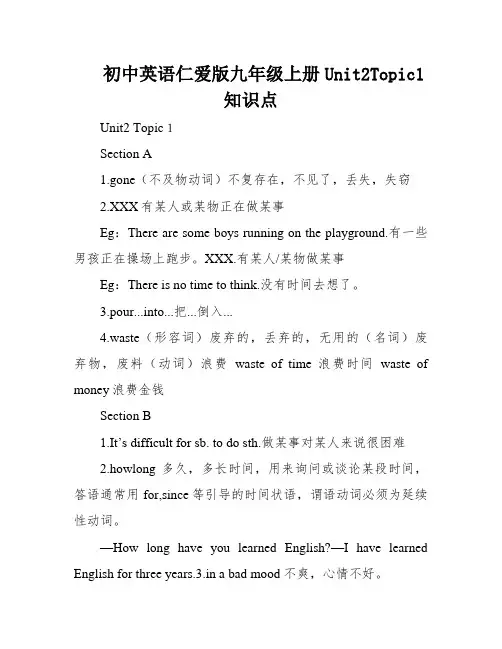
初中英语仁爱版九年级上册Unit2Topic1知识点Unit2 Topic1Section A1.gone(不及物动词)不复存在,不见了,丢失,失窃2.XXX有某人或某物正在做某事Eg:There are some boys running on the playground.有一些男孩正在操场上跑步。
XXX.有某人/某物做某事Eg:There is no time to think.没有时间去想了。
3.pour...into...把...倒入...4.waste(形容词)废弃的,丢弃的,无用的(名词)废弃物,废料(动词)浪费waste of time浪费时间waste of money浪费金钱Section B1.It’s difficult for sb. to do sth.做某事对某人来说很困难2.howlong多久,多长时间,用来询问或谈论某段时间,答语通常用for,since等引导的时间状语,谓语动词必须为延续性动词。
—How long have you learned English?—I have learned English for three years.3.in a bad mood不爽,心情不好。
4.bear(动词)忍受,蒙受(名词)熊,鲁莽的人XXX 忍受...,对...有耐烦Eg:Please bear with me while I ask some questions.当我发问你时,请耐烦些。
作动词时常能够stand交换,stand蒙受,禁受;忍受,容忍,常与can,could 1连用。
stand+名词/代词/doing:忍受某人/某事/做某事I can’t stand working in an offic e.我几乎受不了在办公室工作。
5.anyway不管如何,使用时常常位于句子开头迁移转变处。
6.write to写信给...Section C1.be harmful to =do harm to =be bad for对...有害harm sb./sth.伤害某人/某物Reading in the sun is XXX在太阳底下读书对眼睛有害。
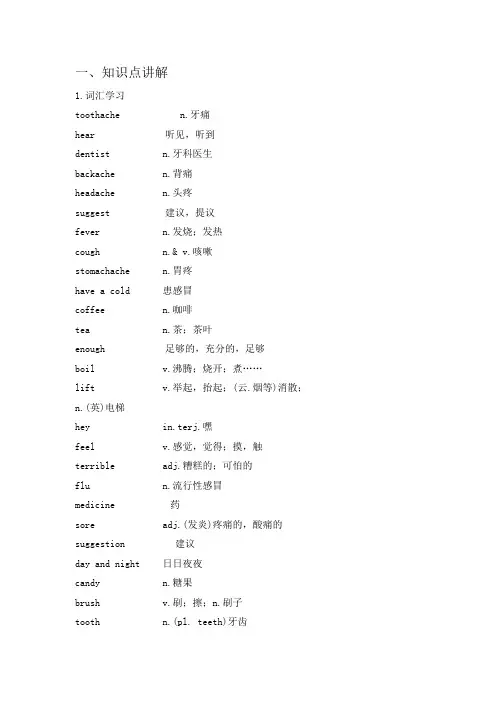
一、知识点讲解1.词汇学习toothache n.牙痛hear 听见,听到dentist n.牙科医生backache n.背痛headache n.头疼suggest 建议,提议fever n.发烧;发热cough n.& v.咳嗽stomachache n.胃疼have a cold 患感冒coffee n.咖啡tea n.茶;茶叶enough 足够的,充分的,足够boil v.沸腾;烧开;煮……lift v.举起,抬起;(云.烟等)消散;n.(英)电梯hey in.terj.嘿feel v.感觉,觉得;摸,触terrible adj.糟糕的;可怕的flu n.流行性感冒medicine 药sore adj.(发炎)疼痛的,酸痛的suggestion 建议day and night 日日夜夜candy n.糖果brush v.刷;擦;n.刷子tooth n.(pl. teeth)牙齿lie 躺,平躺lie down 躺下1.重点句型1. You should see a dentist. should/shouldn’t 应该/不应该2. —I have a headache. —You should stay in bed and have a good sleep.3. —I have a fever. —You should drink enough boiled water.4. —I can’t sleep well at night. —You shouldn’t drink coffee or tea in the evening.5. —I have a backache. —You shouldn’t lift heavy things.6. You shouldn’t read in the sun.7. He should see a doctor.8. You shouldn’t eat too m uch.2.课文呈现Betty: Hello, Kangkang! You don’t look well. What’s wrong with you? Kangkang: I have a toothache.Betty: I am sorry to hear that. You should see a dentist. Kangkang: I think I will.Betty: I hope you will get well soon.Kangkang: Thank you.3.课文知识点讲解1. What’s wrong with you? 你怎么了?类似的说法还有:what’s the trouble? What’s the matter with you? Is there anything wrong with…?等。
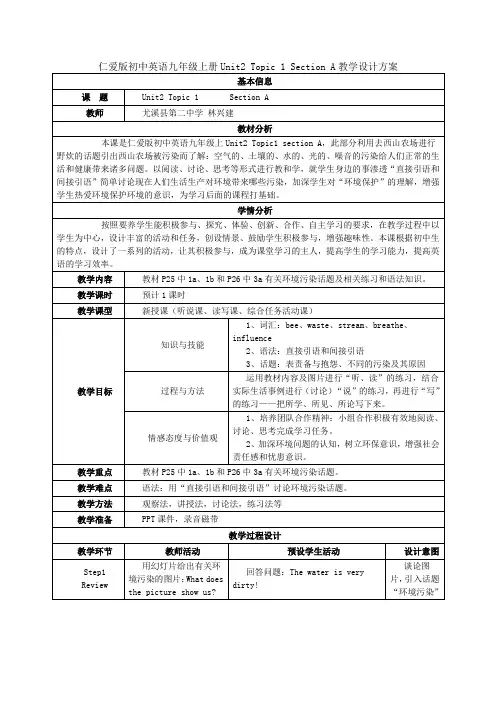
注:1.得分为自评、互评、教师评总分之均值;
2.“我这样评价我自己”、“伙伴眼里的我”以及“老师的话”都是针对课堂学习情况的概括性评判和描述。
2.课堂小组协作学习评价系列表
表三:小组成果汇报评价表(折合成30分)
注:1.本表针对该生所在小组作评价,对该生的评价还需要在小组内进行分配。
对于每个小组都有N 张这种评价表,取所有评价表的均值作为对该小组的评价得分。
2.本表分为定量和定性评价两部分;
3.本定量评价表满分为100分,在加入总分时需进行折合;
4.定性评价部分,听完汇报后我的问题是评价者在听取他组汇报时所想到的问题,评价意见是对被评小组的优点及需要改进之处作评价,以作该小组改进之用。
3.学习感受(20)
上完本次课,你有什么感受?收获了哪些?你觉得自己还可以做那些改进?比如在小组合作方面,比如在课堂参与方面,比如在练习方面……?
[教师根据学生反思深度给分]
4.学生总体活动统计表
表四:定量评价量表。
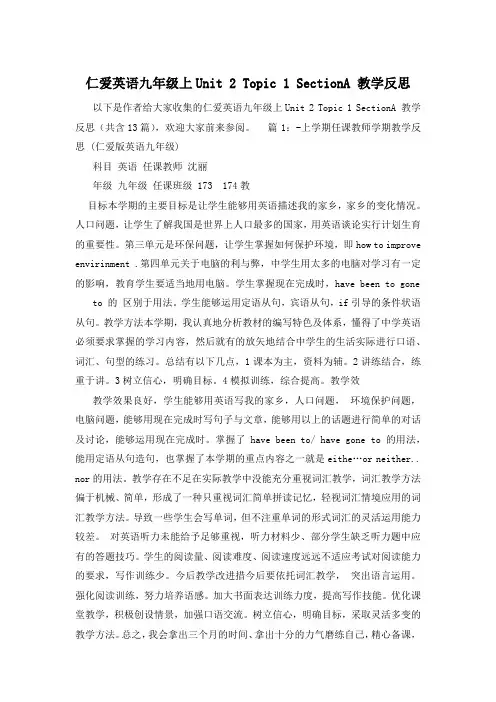
仁爱英语九年级上Unit 2 Topic 1 SectionA 教学反思以下是作者给大家收集的仁爱英语九年级上Unit 2 Topic 1 SectionA 教学反思(共含13篇),欢迎大家前来参阅。
篇1:-上学期任课教师学期教学反思 (仁爱版英语九年级)科目英语任课教师沈丽年级九年级任课班级 173 174教目标本学期的主要目标是让学生能够用英语描述我的家乡,家乡的变化情况。
人口问题,让学生了解我国是世界上人口最多的国家,用英语谈论实行计划生育的重要性。
第三单元是环保问题,让学生掌握如何保护环境,即how to improve envirinment .第四单元关于电脑的利与弊,中学生用太多的电脑对学习有一定的影响,教育学生要适当地用电脑。
学生掌握现在完成时,have been to gone to 的区别于用法。
学生能够运用定语从句,宾语从句,if引导的条件状语从句。
教学方法本学期,我认真地分析教材的编写特色及体系,懂得了中学英语必须要求掌握的学习内容,然后就有的放矢地结合中学生的生活实际进行口语、词汇、句型的练习。
总结有以下几点,1课本为主,资料为辅。
2讲练结合,练重于讲。
3树立信心,明确目标。
4模拟训练,综合提高。
教学效教学效果良好,学生能够用英语写我的家乡,人口问题,环境保护问题,电脑问题,能够用现在完成时写句子与文章,能够用以上的话题进行简单的对话及讨论,能够运用现在完成时。
掌握了have been to/ have gone to 的用法,能用定语从句造句,也掌握了本学期的重点内容之一就是e ithe…or neither.. nor的用法。
教学存在不足在实际教学中没能充分重视词汇教学,词汇教学方法偏于机械、简单,形成了一种只重视词汇简单拼读记忆,轻视词汇情境应用的词汇教学方法。
导致一些学生会写单词,但不注重单词的形式词汇的灵活运用能力较差。
对英语听力未能给予足够重视,听力材料少、部分学生缺乏听力题中应有的答题技巧。
同步课堂仁爱版八年级英语上Unit 2 Keeping HealthyTopic 1 You should brush your teeth twice a day.一、重点词语toothache牙疼hear听见,听到headache 头疼suggest 建议,提议fever 发烧,发热cough 咳嗽stomachache胃疼coffee 咖啡tea 茶;茶叶enough足够的,充分的。
足够lift举起,抬起;(云、烟等)消散。
(英)电梯feel觉得,感到terrible糟糕的;可怕的medicine药suggestion建议,提议day and night 日日夜夜candy糖果brush 刷;擦。
刷子tooth牙齿lie躺,平躺while当……时候;而,然而。
一段时间,一会儿cry叫喊,叫声。
哭;喊叫taxi出租车X-ray X光照片;X射线serious严重的;严肃的;认真的care照顾,照看;小心,谨慎。
关心,关怀;关注,在意still 仍然,还是fruit 水果;果实;结果worry担心,担忧advice忠告,劝告,建议二、词组1.have a cold/a toothache /a fever/a cough/a backache/ a stomachache/ a sore throat / the flu /sore eyes感冒/牙疼/发烧/咳嗽/背疼胃疼/咽喉发炎/流感/眼疼2.take a rest=have a rest 休息3.not read for too long 不要看书太久4.boiled water 开水5.stay in bed 卧病在床,躺在床上6.have a good sleep 好好睡一觉7.feel terrible 感觉难受8.day and night 日日夜夜9.You`d better=You had better 你最好-------10.not so well 很不好11.not too bad 没什么大碍12.much better 好多了13.go to see a doctor 去看病14.take /have some medicine 吃药15.take------to-----把--------带到--------16.send------to-------把-------送到-------17.hot tea with honey 加蜂蜜的热茶18.lie down 躺下19.look after=take care of 照看,照顾20.brush teeth 刷牙21.have an accident 发生一次意外/事故22.don`t worry 别担心23.worry about 担心--------24.nothing serious 没什么严重,没什么大碍25.check over 诊断,仔细检查26.thank you for------------因--------而感谢你27.buy------for----为------买------28.not------until----直到-------才----29.ice cream 冰淇淋30.both----and---------和-------都是----31.take some cold pills 吃感冒药32.plenty of 许多,大量三、重点句型1. What`s wrong with you/him/her?你/他/她怎么了?同一句:What`s the matter with-------? What`s the trouble with------?2.You should see a dentist.你应该去看牙医。
一、仁爱九年级英语(上)第二单元重点必背Unit 2 Saving the EarthTopic 1 Pollution causes too many problems.短语see sb. doing sth.看见某人正在做某事see sb. do sth. 看见某人做了某事several = some = a few 几个my goodness 天啊!pour …into … 把…倒入…be harmful to = do harm to 对…有害quite a few / lot / bit 许多,大量breathing problems 呼吸问题sleep well = have a good sleep 好好睡一觉be in a good / bad mood 好心/坏心情hearing loss 听力丧失 in public 在公共场所had better (not) do sth最好(不要)做某事all sorts of =all kinds of 各种各样的high blood pressure 高血压go deaf 变聋重点句型1. The flowers and grass have gone! 花和草都没有了!2. Look, there are several chemical factories pouring waste water into the stream.看!有几家化工厂把废水往河里放。
3. There be +sb. / sth. +doing sth. 有某人/物正在做某事4. Everything has changed. 一切都变样了。
5. What’s wrong with you?=What’s the matter/ trouble with you? 你怎么啦?6. How long have you been like this? 你像这样有多久了?7. I’ve been like this since last week. 自从上个星期以来我就一直这样。
仁爱版八年级上重点短语句子Unit2 Topic1 短语Section AHave the flu 患流感;Have a sore throat/headache/toothache/feverHave lunch/Breakfast/Supper/Dinner吃饭。
What’s the matter(with sb.)/what ’s wrong(with sb.)/Is there anything wrong ( 某人)怎么了?See a doctor/ dentist 看医生/牙医Section BHad better do something最好做某事Had better not do something最好不要某事表示对别人的劝告/建议/表示一种愿望Feel like后跟名词,代词,动名词想要做某事=Want to do=Would like to do somethingLie 躺(lay lain lying)Tell sb a lie撒谎Lie to somebody对某人撒谎Boiled water 开水Stay in 待在Too much+n.不可数/too many+n.可数太多; Too much water/Too many applesmuch too+adj./adv. 太... Much to difficulty Section C-DSomething new一些新的事物Take some medicine/bills =Have some medicine/bills不要服药Be careful=Look out当心!In the sun 在阳光呀Take...to...带...去...Brush one ’s teeth 刷某人的牙Happen to 发生Call a taxi 打的Look after=take care of =care for照顾Ask for+时间’s leave 请几天的假Two weeks’ leave=a two-week leaveLeave for动身去某地Leave sth behind把……留下?Be worried about=worry about 担心Follow sb advice跟随,遵循Advice sb to do something=Suggest doing sth建议某人做某事重点短语及交际用语1. I'm sorry to hear that.2. I hope you'll get well soon.3.—What's the matter with him/her?4.—He/She has a cold/a fever/a cough/a headache/a toothache/a backache stomachache5.You should stay in bed and have a good sleep6.You don't look well7.Well, 'm feeling terrible!8.—How long have you been like this?—Two days.9.You'd better take some medicine10.Shall I take you to the hospital?11.I don't feel like eating.12.You'd better not go to school today.13.You should lie down and rest.14. You shouldn't eat hot food.15.---How are you feeling today?---Not too bad.16. Your X-rays show it's nothing serious17. Have a god rest and don't worry about it18.Follow the doctor's advice, and you'll get well soon仁爱版八年级上重点短语句子Unit2 Topic2 I must ask him to give it upSmoking重点短语Ask sb.to do sth 请求某人做某事Give up+doing 放弃做某事Stay up 熬夜Put...into... 把...放...Be bad for 对...有益;be good for 对...有害Give(gave)up doing sth 放弃做某事Show sth. to sb. 向某人展示某物Without--with 没有--有Be careful (not) to do 注意(不)做Force sb to do 强迫某人做某事Have to do 不得不做Make sb./sth do sth 让某人/某物做某事Be surprised to do 惊讶地做 ...Be surprised at 对...感到惊讶To one's surprise 使某人惊奇的是Have a bath洗澡;take a shower淋浴In public 在公共场所As soon as possible 尽可能快地(放在句末)Not only...but also... 不但...而且...Need to do 需要做某事Run to 跑向a piece of advice 一条建议Give/follow /take /ask for advice 征求意见建议Get mad 发疯As soon as... 一...就Unit2 Topic2 重点短语/交际用语1.Staying up late is bad for your health熬夜不利于我们的健康。
初一英语Unit 2 Topic 1He has big eyes湘教版【本讲教育信息】一. 教学内容:Unit 2 Looking different 长相不同Topic 1 He has big eyes 他有一双大眼睛二. 重点、难点:词汇:1. 实义动词have /has2. 形容词的反义词:big/small long/short3. 人体部位名词:leg / hand / face / nose / ear / shoulder / foot / mouth / eye / hair / head / neck / arm / knee / toe语法:1. have 的四种句式(肯定,否定,疑问及简略回答)2. have/has的区别具体内容:Section A1. Who’s your favourite film star?(1)who’s是who is 的缩写,英语有许多缩写形式。
如:what is =what’s;who are=who’re;what are=what’re;that is=that’s;can not=can’t;do not=don’t;does not=doesn’t;Tom is=Tom’s。
(2)有些情况不能有缩写形式。
如:this is 和these are。
肯定回答中也不能缩写。
(3)favourite既可用作形容词又可用作名词。
例:What’s your favourite subject /book/film/song?(形容词)My favourite food is cake,what’s your favourite?(名词)2.He has short hair ,a wide mouth and a big nose.(1)has 是have 的第三人称单数形式,动词have表示归属,意为“有”“占有”,have用于除第三人称单数外的其它任何人称,而has仅用于第三人称单数,如:I /You /We/They have a footballHe /She /It has two ears.(2)have 和has 的否定式分别为don’t have 和doesn’t have。
仁爱版英语七年级上册Unit 2 Topic 1第二部分基础知识运用(55分)Ⅰ.单项选择。
(10分)( )1. —____ is your teacher?—It’s Miss Gao.A. WhatB. WhoC. WhereD. How ( )2. Tony and I are good friends, but we are in different ____.A. classesB. schoolC. gradeD. age ( )3. Her hair ____ black and long.A. hasB. amC. isD. are ( )4. —____ Wang Fang have two small eyes?—No, she has two big eyes.A. DoesB. DoC. IsD. Are ( )5. Mr. Lee is English. He comes from ____.A. CanadaB. EnglandC. JapanD. China ( )6. —Look, the girl has long legs.—____A. That’s right.B. Yes, she is.C. Thanks.D. Good. ( )7. —Does Li Ying have a small mouth?—No, she has a wide ____.A. itB. themC. oneD. ones ( )8. I ____ a big nose, but he ____ a small nose.A. have; haveB. have; hasC. has; hasD. has; have ( )9. They are in ____ but in ____.A. same grade; different classesB. the same grade; different classesC. same grades; different classD. the same grades; different class ( )10. —Do the two boys have big noses?—____A. Yes, they are.B. No, they aren’t.C. No, they have big ones.D. Yes, they do.( )11. ____ bikes are red. ____ are blue.A. We; TheyB. Our; TheirC. Our; TheirsD. We; Their( )12. The dress ____ yours.A. lookB. looksC. looks likeD. are( )13. Please give this book ____ Jack.A. atB. toC. inD. from( )14. —You are nice in this dress.—____A. It’s right.B. No, it isn’t.C. Thank you.D. OK. ( )15. Please ____ us find his bike.A. thinkB. helpC. guessD. knoⅡ.情景交际。
Unit2 Topic1 SectionA 教案I.教学目标1.Learn some new words:(1)Learn words about parts of the body:nose,eye,head,face,hair,ear,mouth,neck.(2) Learn some other new words:guess,have,small,has,big,know,right,round,long,wide,girl,boy,short.2.Learn some useful sentences:(1)Oh,I know.(2) Yes,you’re right.3.Learn the simple present tense with “have/has”and adjectives of description:(1) I have a big nose.(2) They have round faces.(3)She has long hair.(4) It has big ears.4.Learn how to describe people’s appearances.Ⅱ.教具黑板、幻灯片课件Ⅲ.教学过程Step1借助体态语,帮助学生学习语言,并培养他们的观察能力。
1.(教师利用手势唱the Body Song,教师应按照从上到下、从局部到整体的手指人体部位,以便帮助学生记忆。
)Please listen and follow me,I will teach you a body song.Show me your hands andfollow me.Please p ay more attention to my fingers.I will touch the parts of mybody.Let’sgo!2.(利用2a的教学幻灯片,操练表示人体部位的名词。
)T:Let’s look at this picture.What’s this?(手指画着头部的图片。
九年级英语第一轮复习导学案九年级上册Unit 2 Topic1复习目标:熟练掌握Unit 2 Topic 1的单词,短语,重点句型及语法复习重难点: Unit 2 Topic1的交际用语语法:一般过去时和现在完成时的区别;复习方法:生自读识记——师提问——检测(书面)教学过程:一、生自读Topic1的单词并识记,同时找出自己不会的单词重点识记。
然后默写。
二、生自读课文并找出文中重点的短语和句子,然后加强记忆,教师提问。
三、教师重点点拨交际用语和语法一.词汇攻关1.butterfly(n.)→(pl.)蝴蝶2.pollute(v.)→(n.)污染3.produce(v.)→ (n.)产品→(n.)生产;制造;制作4.harmful(adj.)→(n.& v.)伤害,损害5.recently(adv.)→(adj.)最近的,不久前的6.environmental(adj.)→(n.)环境7.create(v.)→(adj.)有创造力的→(n.)创建;创造→(n.)生物;动物8.agreement(n.)→(v.)同意,一致→(v.)不同意,有分歧9.produce(v.)→(n.)生产者→(n.)产品10.pleasant(adj.)→(adj.)令人不快的11.include(v.)→(prep.)包括……在内二.熟词新义1.form(v.)(使)出现;使形成;塑造(n.)种类;形式;表格;形状,外形(可数);情绪,状态不可数如:Viewed from above, the valleys form the shape of a man.从上往下俯瞰,山谷呈现出人形轮廓。
She has the intellectual form to take up the mantle of leadership.她具备担当领导职责的聪明才智。
2.mess(n.)肮脏,杂乱;困境,混乱(v.)弄脏;搞砸;制造混乱如:I have to get to the bottom of this mess.我得把这烂摊子弄清楚。
3.guide(n.)向导,导游;指南,手册(v.)指导,引路;影响,操纵如:He guided all of this.4.bear(n.)熊;蛮横的人(v.)承受,忍受如:His rude behavior made him look like a bear.他的粗鲁行为使他看起来像个蛮横的人。
5.sentence(n.)句子;判决(v.)判决,宣判如:The judge will pass sentence tomorrow after looking at the report.法官看完报告后明天会做出判决。
He has been sentenced to pay a fine of 1000 pounds.他被判罚款1000英镑。
He was sentenced to death.他被处以死刑。
6.waste(adj.)废弃的,丢弃的,无用的(v.)浪费(n.)废料,废品如:They have no way to dispose of the hazardous waste they produce.他们没有办法处理掉自己产生的有害废料。
三.重点短语1.把……倒入……2.看见某人正在做某事3.砍伐4.更糟糕的是5.制造噪音6.睡得好7.不能容忍某事/做某事8.解决这个问题9.对……有害10.丧失听力11.同……(几乎)一样(坏),不比……做得好12.也13.变成四.情景交际(1)健康—Good morning, Granny. What's wrong with you?早上好,奶奶。
您怎么了?—Oh, boy. It's difficult for me to breathe.噢,孩子。
我呼吸困难。
—How long have you been like this?你这种情况有多久了?—I have been like this since last week.从上周开始就这样了。
—Have you seen the doctor?您看医生了吗?—Not yet.The factory makes so much noise and I can't sleep well at night.没有。
工厂制造了很多的噪音,我晚上睡不好。
五.知识点点拨考点一There be句型【课本原句】Look, there are several chemical factories pouring waste water into the stream. 看,有几家化工厂正把废水排放到小溪里。
【用法归纳】◆There be的用法:“There be+n.+地点”表示“某地有某物”一般现在时:There is/are+n.+地点一般过去时:There was/were+n.+地点一般将来时:There is/are going to+be+n.+地点/There will be +n.+地点。
如:( )1.Look!There are so many kites in the sky.A.fly B.flying C.flies D.flew( )2.there any cars in your countryside ten years ago?A.Is B.Are C.Were D.Was六.语法1.一般过去时和现在完成时的区别。
六.话题Pollution around us.词汇污染问题:pollute, air / water pollution, coal, oil, plastic, pour, harmful, destroy, rubbish, litter, noise, noisy, waste, dirty, …解决方法与建议:protect, law, environment, clean, fresh,reuse, recycle, plant, build, …七.检测一.词汇检测:根据提示,用单词的适当形式完成句子。
1.The chemical factories(生产)terrible gas.2.Each year people pour(废物)into rivers, lakes and so on. 3.There are(几个)students reading books over there. 4.Loud noises can cause high pressure(高血压)as well. 5.The earth is (shake), and there must be an earthquake.二、阅读理解ANormally, we talk about the spirit of giving, and it is important to do this. But we hardly hear any talk about the spirit of receiving. Very few people know how to receive a gift kindly. Therefore, while we arereceiving a gift, we are actually rejecting it. And we turn off the flow of love by refusing to allow the other person to experience the joy of giving.A man knew that his wife dreamed of having a fur coat, but he couldn't afford to buy her such a coat. He loved his wife very much and he wanted to make her happy. Finally, he decided to start a furcoatbuying project. He saved money in every way that he could. Two years later, he brought her a fur coat—not one of the most expensive ones, but a nice fur coat. He gave it to his wife on her birthday. When she saw the coat, she said, “Oh, Bill, how could you? You know how much we need a new sofa.”Then after a while, she said, “But it is nice, thank you.”But the husband's feeling were hurt. Two years of love was hurt by her words—she didn't accept a gift kindly.Do we often act this way when we receive a gift? Are we sometimes too proud, or too cold? Or are we not strong enough to let the other person do the giving?Are you unwilling to allow the other people to experience the joy of giving? After reading this passage, you may know what to do when you receive a gift next time.( D )21.We often talk about the spirit of giving, but we hardly hear any talk about.A.experience the joy of givingB.experience the joy of receivingC.the way of givingD.the spirit of receiving( B )22.From the second paragraph, we can learn that .A.the man had a very good jobB.the man saved money in order to buy his wife a giftC.the women started a softbuying projectD.the woman thought the fur coat was not as nice as her friend's(A )23.The man was probably very after hearing his wife's words.A.sad B.happyC.relaxed D.shy( C )24.We know from the passage that the man's wife .A.often did silly thingsB.never gave his husband giftsC.received a gift on her birthdayD.often bought expensive things( C )25.The author mainly wants to tell us that .A.giving is more important than receivingB.we should be proud of what we haveC.receiving a gift kindly is very importantD.a man and his wife should learn how to get along well with each otherBHave you heard of Aqua exercises? They are exercises done in water. They are also called water exercises. It is believed that aqua exercises can help people burn more fat than exercises on dry land. There are two main types of aqua exercises.First, aqua jogging. We must wear a special belt which can protect us and help us floating as we run in the water. Although we are in water, we should run very hard as if we were jogging on dry land.Aqua jogging can protect our joints(关节) and at the same time make our muscles(肌肉) work hard.The famous actress, Jennifer Aniston, is reported to aqua jog for fifteen minutes every day. Now there are many aqua jogging clubs and classes all over the UK.Second, aqua Tai Chi. Tai Chi on land is an ancient Chinese exercise designed to improve balance, reduce stress and help people to relax. Aqua Tai Chi can do this better. Peter Chou, who has established a Tai Chi school, says,“Tai Chi is about fluidity(流动性) and relaxation. For thousands of years, experts have been asking people to imagine being in water when they are practicing Tai Chi, so why not actually put them in water? When their hands and feet move slowly through water, the people can experience what fluidity feels like both mentally and physically, and understand this exercise better. The water can also make them slower and more relaxed.”People will need an understanding of Tai Chi and should be able to perform some of the simple movements on land before trying aqua Tai Chi. It is not suitable for beginners because they need to see how the teachers' hands and feet are moving, which is not easily done underwater.( B )26.We can know from the first paragraph that aqua exercises .A.can help people grow fatterB.can help people lose weight fasterC.are the same as those on dry landD.mean movements of the water( B )27.What's the Chinese meaning of the word “floating” according to the second paragraph ?A.生存B.漂浮C.划动D.下沉( A )28.Peter Chou told us the reason why .A.practicing Tai Chi in water was better than on landB.Tai Chi was popular in ChinaC.we should be slow when we are practicing aqua Tai ChiD.we should often move our hands and feet( D )29.According to the passage, which of the following is TRUE?A.Only beginners need to wear belts when jogging in water.B.In water, we shouldn't run very hard.C.It is good for beginners to start learning Tai Chi in water.D.Jogging in water can protect our joints.( A )30.Which is the best little of the passage?A.Aqua Exercises B.Aqua JoggingC.Aqua Tai Chi D.Chinese Tai ChiCIt seems that everybody tells lies well, not big lies, but “white lies”. 31Actually, it's a good way to help people out. Most of the time, people do it because they want to protect friendship or they don't want to hurt someone. Here are some ways they do it.32People often lie because they want to hide something from someone. For example, Jack wants to go out to play soccer, but he tells a lie to his parents to say that he will go to the library to study.Giving false excuses. 33For example, someone invites you to a party. You think it will be boring, so you say you're busy.Lying to make someone feel good. Often we don't tell the truth to make someone feel good. 34Do you say so? No! You probably say, “Hmm, this is delicious!”Lying to hide bad news. 35For example, you have just had a terrible day at work, but you don't want your family to worry about you.So if your parents ask you about your day, you just say everything was fine.A.Sometimes, we don't want to tell someone bad news.B.Telling white lies is not always so bad.C.Sometimes people lie because they don't want to do something.D.For example, your friend cooks dinner for you, but it tastes terrible.E.Lying to hide something.31. B 32. E 33. C 34. D 35. A三、完形填空(2018·广州)Before graduating college, Jackie began to look for a job. She aimed at a famous company, but the 11for such jobs was very strong. The company Jackie chose planned to employ only one person, but more than twenty people applied for the job. 12,Jackie was one of the three people invited for the final interview. The interview was very 13. The interviewer asked just a few questions and it was all over in less than 10 minutes. Then the interviewer said to them, “All of you are very good. Please go home and 14our response.”Three days later, Jackie received a message saying she would not be 15the job. She felt deeply disappointed. That evening, however she received another 16. This time it said that she got the job.Jackie later found out that the first message sent to her phone was part of the interview—a 17to see if she was suitable for the job. All the three people received the 18 text, but only Jackie's reply 19the company of the three, one did not reply. The other said “goodbye” and Jackie said “thank you”. This reply showed that Jackie was a(an) 20person, so the company offered her the job.( C )11.A.exam B.work C.competition D.plan( A )12.A.Thankfully B.UnluckilyC.Hopefully D.Immediately( D )13.A.long B.strict C.interesting D.simple ( B )14.A.pick up B.wait for C.deal with D.think of ( A )15.A.offered B.returned C.refused D.shown ( D )16.A.letter B.email C.call D.message ( C )17.A.guide B.conversationC.test D.lesson( A )18.A.same B.other C.second D.whole ( B )19.A.reached B.satisfied C.helped D.surprised ( C )20.A.brave B.clever C.polite D.honest 四、词语运用(2018·青海改编)studying when you are at school. School is also the 36where you learn to get along well with people. But this is not always easy. What can you do if you just don't like one of your classmates?If you 37that you have problems 38along with your classmates or friends, the most important thing to learn is tolerance(宽容). Tolerance is the ability to realize and respect the differences in others. We cannot change the way that other people do things, so it is important to learn to live 39with them.Tolerance will make everyone get on 40with each other. Getting to know others makes us understand others'41.Something different does not exactly mean that it is bad. Tolerance tells us to keep an even temper and open mind.You need to remember an old saying,“Treat others how you want to be treated.” You would like to be treated kindly by your classmates, 42it is important to treat them kindly too. If you tolerate something, it does not mean that you have to like it. No one is asking you to change who you are or what you believe in. Tolerance just 43that you should respect the differences in others and not try to make them change.It is important to practice tolerance because it will make 44 life easier. Learn to accept people for their different abilities and 45. The world is very different, and practicing tolerance in your own school and city can help make things better.36.place 37.discover 38.getting39.happily 40.well 41.differences42.so 43.means 44.everyone's45.ideas五、补全对话A:Hello! Tomorrow is Sunday, and it's a nice day. What are we going to do?B:I nearly forgot to tell you. We will go to the Old People's Home tomorrow.A:46.Why are we going there/What are we going to do there ?B:The days are getting colder and colder. We'll help the old people there clean their quilts and have their hair cut.A:47.That sounds interesting/Sounds great/That's a good idea/Wonderful/… .B:That's not only interesting, but more educational.A:By the way, 48.how are we going there/how will we go there/how do we go there ?B:Some ride bikes there, and some take the bus. Which do you prefer?A:49.I think riding a bike is interesting/Riding a bike is more interesting than taking a bus/Riding a bike is a kind of lowcarbon life .B:Yeah, it gives us a chance to do sports and we can see some sights on the way. What's more, we protect the earth with our actions at the same time.A:50.When and where shall we meet/When and where shall we get together ?B:8 o'clock at the school gate. The school flag is the sign. Don't be late.A:See you then!六、书面表达Pollution around us.词汇污染问题:pollute, air / water pollution, coal, oil, plastic, pour, harmful, destroy, rubbish, litter, noise, noisy, waste, dirty, …解决方法与建议:protect, law, environment, clean, fresh,reuse, recycle, plant, build, …。